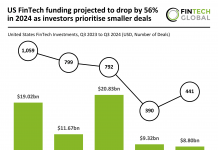BigTech companies like Amazon and Google has changed the customer expectations for online experiences regardless of industry, but will these experiences be tied to the success of firms in wealth management.
Customer experience has slowly become one of the most important areas for firms. It is estimated that two-thirds of marketers claim they compete on customer experiences, according to research from Gartner. While another report, which is from Dimension Data, claims 84% of companies that work to improve their customer experience report an increase in revenue.
The pandemic has forced a lot of companies to accelerate digital services. While wealth management has typically been a little slower to adopting new technology, compared to other industries, there is a big incentive to make this move. WealthTech company Nucoro recently stated that over half of companies in the wealth management sector could vanish if they fail to innovate digitally. With pressures on to digitise, will they also be subjected to the battle of customer experience.
Nucoro COO Nikolai Hack said, “In a world where the underlying investment products are less and less important, most (if not all) of the differentiation happens in the user experience of a proposition. To take an extreme example: For the consumer, the difference between a challenger proposition like Robinhood and an incumbent like Hargreaves Lansdown lies almost exclusively in the user journeys and interfaces. Especially with younger generations, trust matters less and less and legacy brand equity can actually be a hindrance to adoption. Especially since Covid has eliminated any IRL interactions, digital customer experience is pretty much all that matters for the success of a firm.”
As companies move to the digital world, there needs to be a focus on ensuring streamlined processes. People are unlikely to use a digital service if it feels dated and complicated to use. Poor onboarding practices alone are believed to cost European financial institutions more than €5.7bn each year, according to research from P.A.ID Strategies. The report also claims 63% of consumers in Europe abandon financial applications due to poor onboarding services.
It is not a secret that companies will need to look towards improving their customer lifecycle management systems, but wealth managers are typically slow to change and are quite far behind. Hack added that the sector is very far behind the curve. This is evident when looking at other sectors. Within media, entertainment, shopping and many others, clients have a minimum expectation for immediate access and 24/7 availability, flat predictable pricing and flexible subscription schemes, hyper personalisation through algorithmic automation and more, he said. “Businesses that don’t adapt to these changes in customer expectations will eventually be driven out of the market.”
Kidbrooke co-founder Fredrik Daveus also highlighted the importance of customer lifecycle management in today’s world. He said, “CLM is paramount these days, especially as onboarding keeps getting easier and easier thus lowering the barriers of a customer switching provider. The focus should also be on automation and providing value to really continuously mitigate churn. The technology for high quality automated proactive notification is already available so innovative first movers have already begun implementing and is generating valuable learnings on a daily basis on what works or not. This head start will be really tough for laggards to make up for unless they start making some key decisions in this area asap.”
Automation appears to be a big part of improving customer lifecycle management, with Hack also stating this development would do wonders for a company. By implementing automation capabilities across all functions would empower them to scale what works and identify what doesn’t.
Copyright © 2021 FinTech Global











